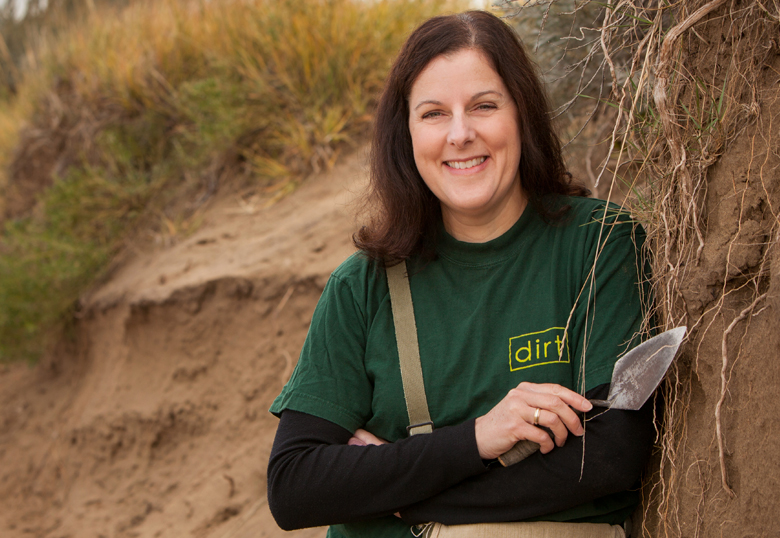Dr. Shawn Bubel (BSc ’96) will readily admit she had an ulterior motive when she enrolled as a chemistry major for her undergraduate studies at the University of Lethbridge.
It wasn’t as though Bubel didn’t enjoy chemistry; she was in fact very good at it, along with biology and physics. Most importantly, it had the ringing endorsement of her family and high school advisors. But Bubel knew that by coming to a liberal arts university such as the U of L, she could major in chemistry but also dabble in what she truly loved, archaeology.

“I always wanted to be an archaeologist but everyone told me that it wasn’t a real career and that I’d never get a job,” she says. “So, I started out as a chemistry major. At the end of my first year, I went to an archaeological field school in Israel and when I came back, I knew. As much as I think chemistry is very interesting, I love archaeology. Even though there wasn’t an archaeology major at the time, I did an individualized multidisciplinary major in archaeology, geography and anthropology.”
So began an academic career that has taken Bubel around the world. On Thursday, she presented the latest PUBlic Professor Series lecture at Lethbridge City Hall, Prehistoric Bison Hunters in Southern Alberta: Excavations at Fincastle Site.
Originally from Coronation, and then Fort Saskatchewan, AB, Bubel specifically chose the U of L for its liberal education focus but also because it offered the small campus experience that better suited her. Little did she know that after graduating with a BSc that she’d eventually find her way back as a faculty member following her masters and PhD studies.
“The faculty members at the University of Lethbridge are wonderful. They are exceptionally supportive. When I was working on my PhD in Belgium, they gave me the opportunity to come back and teach here as a sessional,” she says, conducting her first summer classes in 1997 and eventually taking U of L students to Belgium on her field project in 1999 and 2000.
When a faculty spot opened up in the Department of Geography, she was hired on a term contract and before long, she applied for a tenure-track position and has been in the fold ever since.
There’s no denying Bubel’s love of archaeology and her unquenchable desire for discovery.
“When I was little, I dug up my entire backyard,” she says. “I just loved digging, anywhere, I didn’t care, just digging up the ground. I’d steal the spoons out of my mom’s cutlery drawer and I’d go outside and dig – all day long. Finally, I was cordoned off into one section of the yard and only allowed to dig there.”
Now, people call her to dig, as was the case at Fincastle. A noted kill site, the area was being looted by a local community member and the Government of Alberta was fearful that its treasures would be lost forever.
Bubel was brought in, and in 2003, her project began. Some 10 years later, more than 280,000 bone fragments were uncovered as well as one of the great oddities of her career – seven non-utilitarian upright bone features that would garner Bubel the second most viewed and shared story among Western Digs’ Top 5 Archaeology Discoveries in the American West of 2015.
She was excited to share some of that story with the PUBlic Professor crowd.
“It is really important to share our knowledge and information as broadly as we can and to include people in the community,” she says. “In archaeology, the more eyes and perspectives you have, the better the interpretation will be. I try to be as unbiased as possible, and to step away from my own preconceptions but you can’t do that completely. We are who we are. I always have First Nations students, community members and Elders on my Alberta projects because it is important to include their perspectives. We work together to try to figure out the story of the site. You can never do that completely, we don’t have a time machine, but you can certainly achieve a better interpretation of the past when more people study the information.”
She says there is great value in learning about the past.
“Archaeology reveals our stories; the things we’ve done, the challenges we’ve faced, the successes we’ve had,” she says. “If you do not understand where we’ve been, you cannot understand where we’re going. Choices are made based on who we are, and part of who we are is who we were. Archaeology offers insight into how we move forward.”
Bubel often thinks back to her first field experience and that initial opportunity as an undergraduate student to get her hands in the dirt. It helped shape her life and it is an experience she likes to pass along.
“I know how my first field experience changed my world, so I want to offer that to my students,” she says. “To be honest, there is nothing better than watching them find something for the first time. It is an incredible atmosphere and it takes me back to the thrill of uncovering something that was buried for hundreds of thousands of years. It reminds me how much I love my job. Seeing their worlds open up – not just because of the archaeology but also the cultural experiences – is very gratifying.”
While the thrill of her first great find might be in the past, the next great discovery is always out there, and if we know one thing about Bubel, she’ll keep digging.


